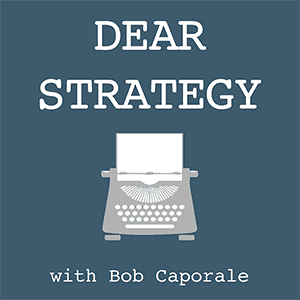Dear Strategy:
“How do you go about prioritizing and balancing long-term versus short-term goals?”
This is going to be a bit of a continuation from the answer that I gave in Episode 16, which you can view by clicking here. That question was geared more around balancing your portfolio between new and existing products. But this question ties directly to that theme because short-term goals will normally be focused around the products you have in market today, while your long-term goals will normally be focused around products that have yet to be invented.
In this case, however, I want to focus my answer less on the products, and more on the product managers.
One of the main roles of a product manager is to be the steward of the long-term strategy for a given product or portfolio. But this is not an easy challenge, especially given the fact that companies need to make money to stay afloat. And that need to make money is almost ALWAYS going to take center stage over the need to plan.
Small businesses fall victim to this dynamic even more than larger ones because cash flow is typically more difficult to manage when you don’t have a lot of cash to begin with.
Let’s take a small, boutique consulting firm, for example. If the strategy of that firm is to provide a premium service at a premium price, but they don’t have enough cash to pay their employees in a given month, should they start selling their services to the lowest bidder? Or should they continue with their strategy and find other ways to fund their business and their growth?
This is a very common dilemma, and one which must be contemplated by small business owners almost every day. And although I can’t give a definitive right or wrong answer to these questions, I can say that whatever a business decides to do MUST be aligned with its strategy. So, if you decide to shift to a low-cost service because that’s the market you feel you are most capable of playing in, then you have to shift your overall strategy rather than shifting your business model on a case-by-case basis.
Said differently, there’s nothing wrong with being opportunistic in the short-term, as long as its aligned with your long-term strategy. And there’s also nothing wrong with changing your long-term strategy, as long as it is a conscious, calculated, and measured choice.
And whose job is it to make sure that the short-term is aligned with the long-term? If you guessed “the product manager, then you guessed correctly! The product manager needs to be the gatekeeper of the strategy – the conscience of the organization, if you will. Which also means sometimes not being the most popular person on the face of the planet. But that’s a whole other topic altogether.
Hopefully we’ll get to talk about that on a future show!
Listen to the podcast episode
Dear Strategy: Episode 035

###
Bob Caporale is the author of Creative Strategy Generation and the host of the Dear Strategy podcast. You can learn more about his work by visiting bobcaporale.com.





